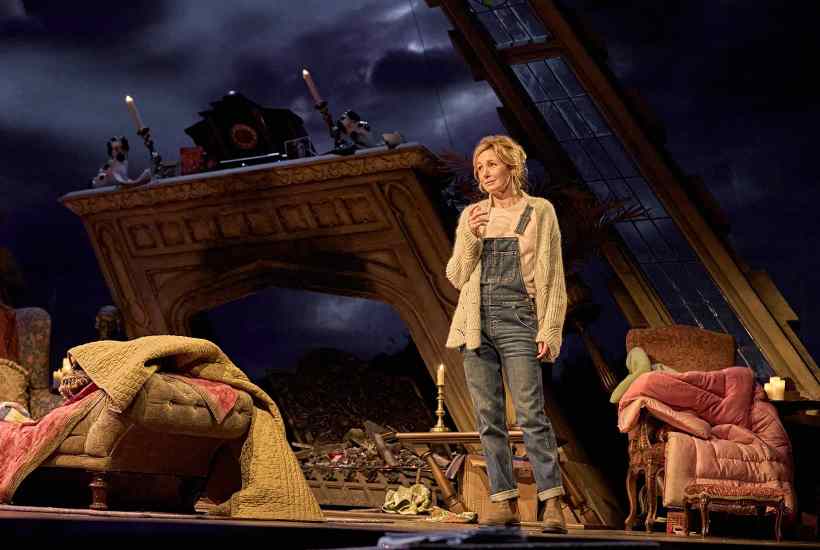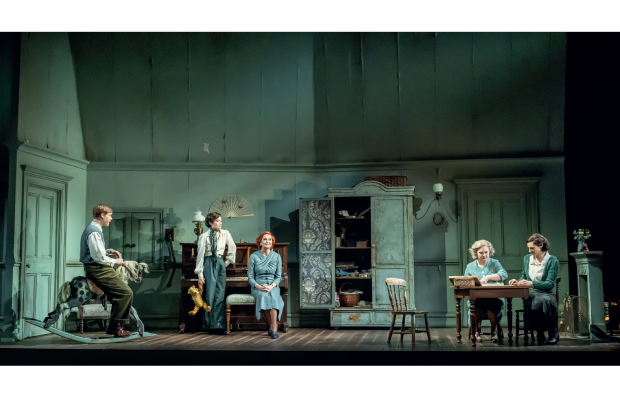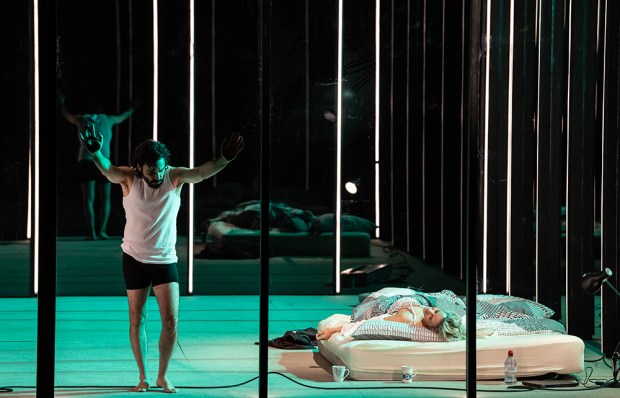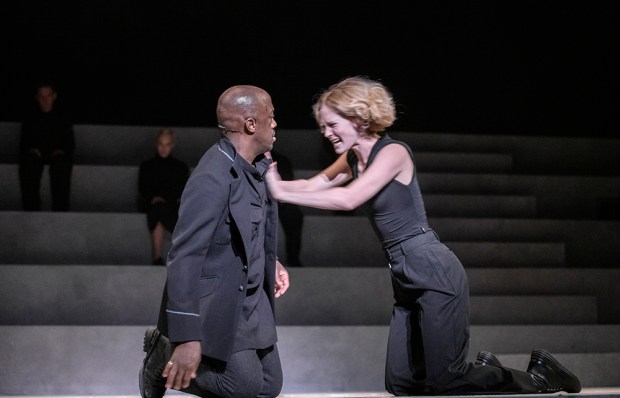Somewhere in the wilds of England a stately home is collapsing. Rising floodwaters threaten the foundations. Storms break over the leaking roofs. Inside, an argument rages between a snooty moron, Lady Diana, and her drunken Marxist husband who used to be rock star.
This is the chaotic opening of Moira Buffini’s country-house drama Manor. The angry husband picks up a hunting rifle and blasts ornaments to smithereens. Then he chases his wife to the top of a staircase where she hits him with a candlestick. Once the fight ends, more commotion erupts as various groups of evacuees rush in through the front doors. Two women arrive from south London. They’re soaking. A daft local priest shows up, followed by a white supremacist with a broken ankle. Much later, his wife is carried in suffering from a bloodied spine.
This cluttered script is well outside Buffini’s normal range. She likes intimate, delicate chamber pieces, and she enjoys pairing characters with complementary or contrasting qualities. Here she has two wives with violent husbands and two mums with uppity daughters, and she adds a handful of drifters, misfits and losers as well.
A script-doctor should have spotted the problems long before this show went into rehearsal. There are too many physical injuries, too many snarky teens, too much external chaos, too much mental instability, too many sermons on history and etymology inserted into the clunky dialogue. There’s a ghost in the attic as well, and a character who dies in Act One but who comes back to life after the interval, even though the corpse has been examined by an NHS nurse. School kids are told not to write this badly.
Buffini wants to deliver a state-of-the-nation play that presents England as a society riven by political and ethnic hate. It’s deeply simplistic. There are nice characters, like the nurse and her lesbian daughter, and nasty characters like the white supremacist, Ted, who chats up Lady Diana by giving her the results of his DNA test. ‘I’m 50 per cent Anglo-Saxon, 40 per cent Celt and 10 per cent Italian,’ he smooches. Is that sexy? Well it is to Lady Diana, of course, because she likes seducing randy, racist, working-class wife-beaters like him.
The script is very naïve about politics and social class. Ted is lauded by his supporters, (all three of them), as if he were a wildly popular demagogue on the verge of power. In fact, poor Ted would struggle to get airtime on a late-night call-in show. And Buffini hasn’t the faintest idea how posh people behave in their own homes. Rudeness to strangers, or to anyone for that matter, is unthinkable.
But Lady Diana bullies her guests with cheap put-downs. ‘I once had a flat in Notting Hill,’ she drawls at a character from Balham, ‘but I never went south of the river.’ It’s unlikely that anybody under 50 would understand that ancient slur.
There’s a profoundly tasteless scene in which Ted encourages a podgy loner to shout racist names at imaginary Asians. Do we need to hear the P-word on stage? It would be tempting to wag a finger at the NT and say: ‘Please, you’re better than this.’ But it isn’t. It has offered us a narrow, divisive, ill-shaped and vengeful drama that matches the rest of its recent output. And, in a bizarre way, it represents a triumph for the National, which has completely annexed the creative imagination of a gifted playwright. No wonder the building looks like a concrete morgue. It’s the graveyard of talent.
Eliot’s Four Quartets is a secular bible full of phrases that will stay with you forever. From ‘Little Gidding’: ‘Who then devised the torment? Love.’ The elusive punctuation adds resonance and ambiguity. Is he saying that ‘love’ is the torment or the deviser of the torment?
Ralph Fiennes performs the text on a spare stage with just a table, a chair and a glass of water. He’s ‘off-book’ (knows it by heart). Behind him are two blank flats, like grey tombstones, that move and revolve to create corridors or portals to other worlds.
Subtle variations in the lights and the sound effects manage to heighten the experience for the viewer. The mind is able to relax intermittently, and to roam from the verbal to the visual and back again. Brilliant work. But there’s a health warning. This is not the way to introduce teenagers to Eliot. A newcomer would find it dull to watch a middle-aged English intellectual prowling the stage and articulating a kind of high-table Buddhism. The more saturated you are in the work the more you’ll relish this production. Here’s how to measure the depth of your love. If you call him ‘T.S. Eliot’ you’re an arm’s-length admirer. True keepers of the flame know him as ‘Eliot’.
Got something to add? Join the discussion and comment below.
Get 10 issues for just $10
Subscribe to The Spectator Australia today for the next 10 magazine issues, plus full online access, for just $10.
You might disagree with half of it, but you’ll enjoy reading all of it. Try your first month for free, then just $2 a week for the remainder of your first year.














Comments
Don't miss out
Join the conversation with other Spectator Australia readers. Subscribe to leave a comment.
SUBSCRIBEAlready a subscriber? Log in